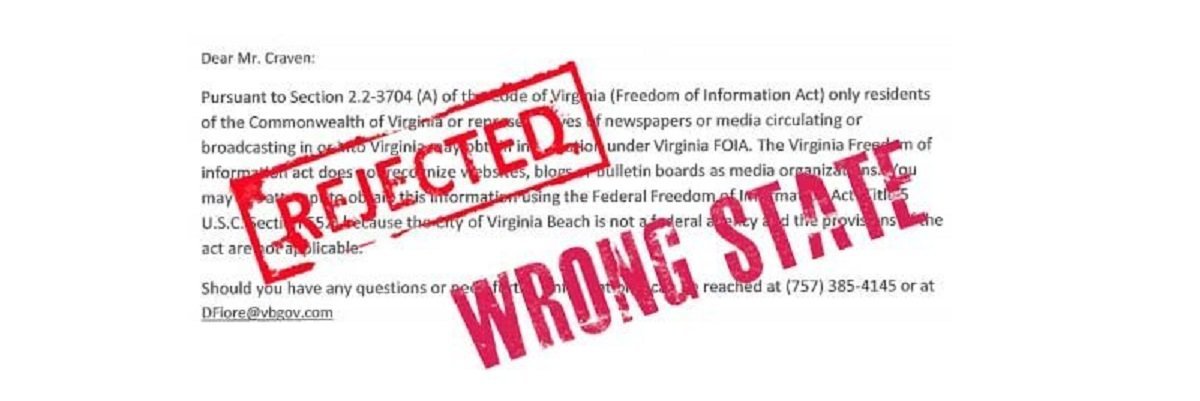Public records laws vary widely from one state to the next. From each statute’s name to the amount of time government agencies are allotted to fulfill requests to the particular list of bodies subject to queries, requesters must juggle a dizzying number of dimensions when submitting to multiple states.
Eight states make this effort particularly difficult by including one simple word in their public records statutes: “citizen.”
The Virginia Freedom of Information Act, for instance, provides that “all public records shall be open to inspection and copying by any citizens of the Commonwealth.” Similarly, the Tennessee Open Records Act requires that public records “be open for personal inspection by any citizen of this state.” Alabama, Arkansas, Delaware, Georgia, New Hampshire and New Jersey have similar provisions in their public records laws.
After the Supreme Court’s April ruling that Virginia’s citizenship hurdle did not violate constitutional protections, the Virginia Freedom of Information Advisory Council issued a brief memo urging agencies across the Commonwealth to fulfill all records requests without distinction between in-state and out-of-state requesters. The FOIA Council, a legislative advisory body whose decisions are non-binding, proposed two reasons for treating all requesters equally:
“(1) it provides for internal consistency in responding to requests, and (2) if you deny a request because the requester is not from Virginia, all the requester has to do is get a Virginia citizen to make the same request on his or her behalf.”
Similarly, Tennessee’s citizenship provision is entirely discretionary. On its FAQ page, the Tennessee Office of Open Records Counsel is clear:
“3. Who is allowed to look at public records?
[....] While only citizens of Tennessee have the right to inspect and receive copies of public records, governmental entities are not prohibited from making records accessible to individuals who are not citizens of Tennessee.”
In a 2009 presentation, Tennessee Open Records Counsel Elisha Hodge underscored this in a presentation to county records custodians, emphasizing for non-citizen records requests, “denial is not required, it is discretionary.” Hodge has confirmed that this is still the position of her office, even following the SCOTUS ruling.
For its part, New Jersey has disavowed its citizenship requirement. Per guidelines from the New Jersey Attorney General, “OPRA [Open Public Records Act] does not prohibit access to residents of other states.” The Georgia Attorney General has issued a similar opinion that puts non-residents on equal footing with state citizens when it comes to obtaining government records.
Despite such clear advice from state records authorities, agencies in both Tennessee and Virginia continue to lean on citizenship requirements that bar requests from non-residents. While each agency has discretion to side with openness, a number stubbornly maintain that requesters outside their borders have no right to government transparency.
Tennessee agencies rejected two requests sent as part of the 2012 Drone Census, both after delays of more than six months. In February, the Nashville police responded to the Drone Census request originally sent the previous July. Captain Mike Hagar of the Metro Police Department replied, “The plain language of the statute does not affirmatively require disclosure to non-citizens.”
Last week, Middle Tennessee State University finally responded to its own Drone Census request, which was sent to the school in October. In denying our request, University Counsel Heidi Zimmerman suggested that “citizenship is required to receive information under the [Tennessee Open Records Act],” and that our request “must be denied.”
MuckRock user Carlton Purvis has found himself faced with a similar denial when he requested suspicious activity reports from the Tennessee Bureau of Investigation last week. Finding no evidence that Purvis is a citizen of Tennessee, TBI General Counsel Jeanne Broadwell denied his request the next day.
Agencies in Virginia have also issued a number of rejections to out-of-state requesters. Last July, the Virginia State Police also rejected our Drone Census query, explaining that, since MuckRock is based in Massachusetts, we are not “entitled to these records (if in existence) under [the Virginia] FOIA.”
A request submitted to Newport News, Va. police as part of our File For Aaron campaign drew MuckRock into the wondrous world of proving state citizenship. The request, which was submitted the day after the SCOTUS ruling this April, was for police reports from October 1989. After a MuckRock proxy provided a valid Virginia driver’s license, Newport News responded that they had none of the requested documents.
Interestingly, the same Virginia Beach records custodian has been inconsistent in his responses to out-of-state requesters. Last July, Sergeant Fiore of the Virginia Beach Police promptly replied to our Drone Census request, indicating that his department “does not use drones.”
A year later, Sergeant Fiore replied in similar lightning time to a request for concealed handgun permits. This time, however, Fiore insisted that “only residents of the Commonwealth of Virginia or representatives of newspapers or media circulating or broadcasting in or into Virginia may obtain information under Virginia FOIA.”
MuckRock is continuing to strategize workarounds to such arbitrary rejections. In most cases, agencies have complete discretion to fulfill requests, no matter where the requester happens to live. But until these statutes are amended, we must continue to ask the same question as Purvis posed to the Tennessee Bureau of Investigation: “Is the state willing to fulfill this request?”




